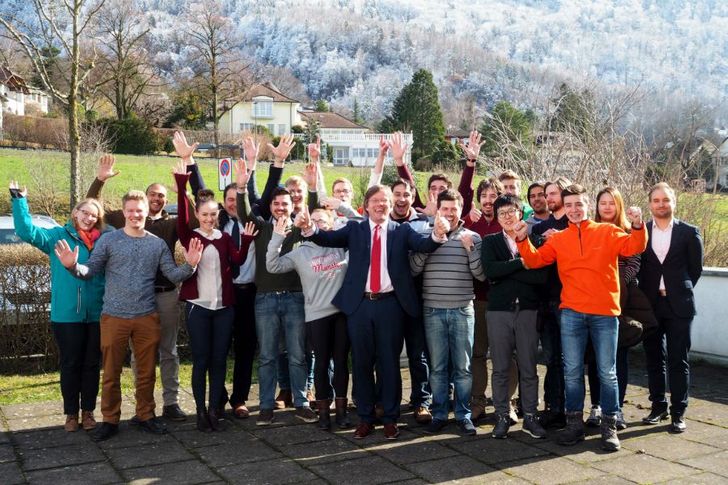Let’s begin with a short story. Do you know who’s behind the “People You May Know” suggestions at LinkedIn or Facebook? A guy named Jonathan Goldman. Back in 20006 he figured out one simple thing called “triangle closing”: the notion that if you know Larry and Sue, there’s a good chance that Larry and Sue know each other, too. “After LinkedIn made it a standard feature, things really took off -- ‘People You May Know’ ads achieved a 30 % higher click-through rate than the rate obtained by other prompts to visit more pages on the site. They generated millions of new page views. Thanks to this one feature, LinkedIn’s growth trajectory shifted significantly upwards,” as Harvard Business Review outlined in one of their 2012 issues.
How to Swim in an Ocean of Numbers
Jonathan Goldman is a data scientist. A pretty smart and important guy, who’s doing the sexiest job of the 21st century. It’s a quite new profession, even though it has been existed “unlabeled” for a long time before the story above even happened. Such people organise big data, they swim in the large ocean of numbers, they sundry data and join different sources to catch up the most critical information for the business of their companies.
What are “information systems”?
Information systems are socio-technical systems using information technology to store, process, and transmit information. Research and teaching in this area are concerned with the design, implementation, and use of information systems, as well as their role in innovating and transforming businesses. Members of the Institute work on topics like process management, sustainability, big data analytics, enterprise resource planning, culture assessment und digital nudging.
If you too want to be a data scientist you have to learn how to swim in that ocean first. And where do you learn all about sexy Data Science? Well, have you considered the University of Liechtenstein?! And specifically, their Institute of Information Systems? It’s a great opportunity and you can choose what exactly you will study there – Big data analysis and their transformation into business values, Enterprise resource planning, Digital nudging and many more interesting courses.
Why not Master?
Information systems are the heart and the soul of all contemporary organizations within our global, rapidly changing economy. A world without information systems is now unthinkable. Managers of the big and very well-known companies (where everybody wants to work) all around the world therefore require unique abilities to make strategic decisions about the development and use of information systems, to identify the potential for innovation originating from information systems, and to understand how business processes, which use the transformative power of information systems to increase productivity, quality, and sustainability, can be designed and implemented.
Student’s Experience
“Hodně se tu klade důraz na týmovou práci, projekty, spolupráci s firmami a prezentace výsledků. Což jsou všechno aspekty, kterých se mi na českých univerzitách nedostávalo.”
- Jan Plojhar, student at the University of Liechtenstein
“Mám hodně rád přírodu, hory, jezera a to tu všechno je. Jsou tu taky skvělí lidé, v ročníku je nás asi 40 a je tu mnohem přátelštější atmosféra, než kdyby nás bylo 400. Opravdu se mi líbí, že tu lidi myslí dost globálně, což bude nejspíš tím, že mám spolužáky z Íránu, Ghany, USA a mnoha jiných zemí.”
- Jiří Herzán, student at the University of Liechtenstein
You can be one of these wanted people with unique and important abilities, too! And there is a Master’s Degree programme at the University of Liechtenstein that can get you there. “The Master’s programme in Information Systems, with its majors in Data Science and Business Process Management, provides well-grounded methodological competences at the intersection between information technology and business required in a digital world. At this, the programme focuses on skills related to both, improving organizational efficiency and innovativeness using the transformative power of information systems,” said Prof. Dr. Jan vom Brocke, Hilti Chair of Business Process Management and Head of the Institute of Information Systems.
Winter School on Business Process Management
The course is organized by the Hilti Chair of Business Process Management at the Institute of Information Systems of the University of Liechtenstein. You will gain a comprehensive understanding of the contemporary state-of-the-art in BPM.
It is especially recommended to Bachelor students and there is only one more little requirement: if you want to attend the Winter School, your English skills should be good enough to actively take part in class discussions. That’s not bad, right? Plus, the costs will be lower for early birds.
Find more information here.
Students are a significant part of international project teams, they develop their social competences which are highly relevant in the dialogue between various stakeholders and business sectors. “Students are enabled to take leadership roles and meet the challenges of a global, fast-changing, and increasingly digital economy. Graduates of the Master’s Degree programme in Information Systems are thus well prepared for a career as a future leader in internationally operating businesses. Our Master of Science in Information Systems is also closely developed with big industry partners,” Jan vom Brocke adds.
The major in Data Science (the sexiest job of the 21st century, remember?) focuses on methodological competences for turning information into competitive advantage and innovation. Upon successful completion of the programme, the university awards the academic degree of Master of Science in Information Systems (MSc).
There are much more interesting information and stories about the whole university and their study programmes on their website at www.uni.li. So go ahead, look them up and apply now!
Text: Nela Vejvodová

















